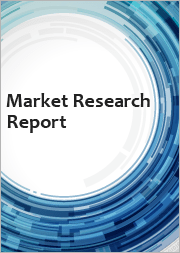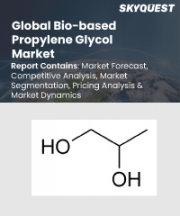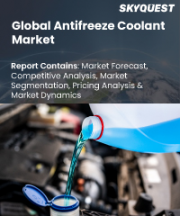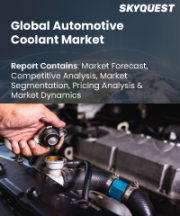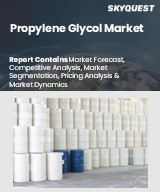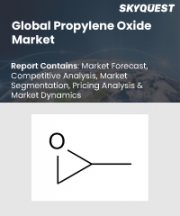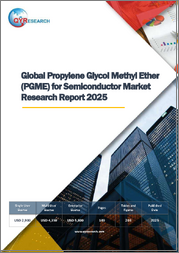
|
시장보고서
상품코드
1761677
프로필렌 글리콜 에테르(PGE) 시장 수요 분석 : 유형별, 용도별, 예측(-2034년)Propylene Glycol Ether Market Analysis, By Demand, By Types, By Applications and Forecast Report Till 2034 |
||||||
세계 프로필렌 글리콜 에테르(PGE) 시장 규모는 2032년까지 110억 달러가 넘을 것으로 예상되며, 2024-2032년 5.6%의 연평균 성장률을 보일 것으로 예상됩니다. 이러한 성장은 화학 제조, 산업 공정, 잉크, 코팅을 포함한 다양한 산업 분야의 수요 증가에 의해 촉진되고 있습니다.
지역 수요 분석
아시아태평양은 급속한 산업화, 도시화, 자동차, 전자, 건설, 제약 등 최종 용도 부문의 확대로 시장을 주도하고 있으며, 중국, 인도, 일본, 한국 등의 국가들이 PGE의 주요 생산국이자 소비국이 되었습니다. 수성 페인트 및 코팅에 대한 선호도 증가와 인프라 개발의 진행이 시장의 강력한 성장을 뒷받침하고 있습니다. 친환경 제품을 장려하는 정부의 노력도 안전한 대체 용매로 PGE의 채택을 촉진하고 있습니다.
북미에서는 특히 페인트, 코팅, 세정 분야에서 PGE를 포함한 저VOC 용매의 사용을 촉진하는 엄격한 환경 규제가 수요를 촉진하고 있습니다. 이 지역의 발달된 자동차, 항공우주, 산업 제조 부문은 중요한 소비처입니다. 연구개발에 대한 투자 증가와 지속가능한 화학 솔루션에 대한 관심 증가도 꾸준한 성장에 기여하고 있습니다.
주요 기업
세계 PGE 시장의 주요 기업은 Dow, Eastman Chemical Company, LyondellBasell, Shell, BASF, Daicel, Hualun Chemical, Dynamic International, Jiangsu Yida, SKC, and Wuxi Baichuan 등으로 기술 혁신, 생산능력 확대, 전략적 제휴를 통해 경쟁하고 있습니다.
최근 몇 년간의 발전
2021년 LyondellBasell은 SINOPEC과 협력하여 중국 닝보에 새로운 PGE 공장을 건설하고, 2024년에는 한국의 Chemtronics Co. 수입 의존도를 해소했습니다. 이 회사는 PGMEA의 생산능력을 10킬로톤에서 25킬로톤으로 확대하여 수요 증가에 대응하기 위해 약 1,670만 달러를 투자할 예정입니다.
주요 시장 촉진요인
전자 산업의 급속한 성장은 프로필렌 글리콜 에테르(PGE)에 대한 수요 증가의 주요 촉매제 역할을 하고 있으며, PGE는 고순도 및 고성능이 필수적인 반도체 제조 및 기타 전자 등급 응용 분야에서 용매로서 중요한 역할을 하고 있습니다. 스마트폰과 태블릿에서 가전제품에 이르기까지 소비자 전자제품의 지속적인 성장과 신흥 시장을 중심으로 한 전 세계 가처분 소득의 증가는 이러한 수요를 더욱 자극하고 있습니다.
또한, 자동차 산업은 PGE 소비에 크게 기여하고 있으며, PGE는 우수한 수용성, 빠른 증발 속도, 아크릴 및 폴리우레탄을 포함한 다양한 수지 시스템과의 상용성으로 인해 보호 코팅에 널리 사용되고 있습니다. 이러한 특성은 산업용 코팅이나 건축용 코팅뿐만 아니라 자동차 마감재에서도 코팅의 내구성, 내식성, 미관 개선에 도움을 주고 있습니다.
시장 억제요인
프로필렌 옥사이드와 같은 석유 기반 원료의 가격 변동은 PGE의 생산 비용에 영향을 미치고, 가격 책정 및 수익성에 영향을 미칩니다. 에틸렌옥사이드 유도체 독성에 대한 REACH 규제를 포함한 건강 및 환경 규제는 일부 PGE의 사용을 제한하고 있습니다. 이러한 규제와 비용 압박은 시장 성장에 도전이 될 수 있습니다.
세계의 프로필렌 글리콜 에테르(PGE) 시장에 대해 조사 분석했으며, 시장 역학 및 산업 동향, 각 부문별 수요, 제조업체 프로파일 등의 정보를 전해드립니다.
목차
제1장 소개
제2장 시장 요약
- 시장의 진화
- 수요 개요
- 산업 구조
- 전략상 문제
- 최종 용도 동향
- 성장 예측
제3장 경제와 에너지 전망
- GDP와 인구통계
- 금융 정책과 재정 정책
- 원유 생산과 가격
- 천연가스
- 전기요금
제4장 최종 용도 부문 실적
- 화학
- 산업
- 잉크·코팅
- 기타
제5장 프로필렌 글리콜 에테르 소개와 시장 개요
- 제품 설명
- 등급과 특성
- 원재료
- 제조 공정
- 환경 문제
- 밸류체인
- 용도
제6장 시장 역학과 산업 동향
- 시장 역학
- 성장 촉진요인
- 성장 억제요인
- 기회
- 과제
제7장 세계의 프로필렌 글리콜 에테르 수요 분석 : 유형별, 용도별(수량과 금액)(2018-2034년)
- 전략상 문제와 COVID-19의 영향
- 수요 분석과 예측(2018-2034년)
- 수요
- 수요 성장률
- 성장 촉진요인 분석
- 세계의 프로필렌 글리콜 에테르 시장 : 유형별
- 프로필렌 글리콜 모노 메틸 에테르(PM)
- 디프로필렌 글리콜 모노 메틸 에테르(DPM)
- 트리프로필렌 글리콜 모노 메틸 에테르(TPM)
- 기타
- 세계의 프로필렌 글리콜 에테르 시장 : 용도별
- 프로필렌 글리콜 메틸 에테르 아세테이트
- 용매
- 응집제
- 잉크·코팅
- 기타
제8장 수요 분석과 시장 리뷰 : 지역/국가별(수량과 금액)(2018-2034년)
- 전략상 문제와 COVID-19의 영향
- 수요 분석과 예측(2018-2034년)
- 수요
- 수요 성장률
- 프로필렌 글리콜 에테르 시장 : 유형별
- 프로필렌 글리콜 에테르 시장 : 용도별
- 북미
- 미국
- 캐나다
- 멕시코
- 서유럽
- 독일
- 프랑스
- 이탈리아
- 영국
- 스페인
- 기타 서유럽
- 중유럽 및 동유럽
- 러시아
- 폴란드
- 기타 중유럽 및 동유럽
- 아시아태평양
- 중국
- 일본
- 인도
- 한국
- 기타 아시아태평양
- 중남미
- 중동 및 아프리카
제9장 가격 분석
제10장 주요 전략상 문제와 사업 기회 평가
- 시장 매력 평가
- 전망과 표적 시장 조사
제11장 전략적 추천과 제안
제12장 기업 분석
- 프로필렌 글리콜 에테르 제조업체 개요/기업 분석
- 기본 상세
- 본사, 주요 시장
- 소유
- 기업 재무
- 제조 거점
- 세계 매출
- 총 직원수
- 제품 포트폴리오/서비스/솔루션
- 채용된 주요 사업 전략과 Prismane Consulting 개요
- 최근 발전
- 대상 기업
- Eastman Chemical Company
- Lyondell Basell
- Shell
- BASF
- Daicel
- Hualun Chemical
- Dynamic International
- Jiangsu Yida
- SKC
- Wuxi Baichuan
- Jiangsu Ruijia
- Yancheng Super
- Jiangsu Yinyan
- Zhongtian Huanbao
- 기타 제조업체
제13장 부록
ksm 25.07.10The global Propylene Glycol Ether (PGE) market is projected to grow at a CAGR of 5.6% from 2024 to 2032, surpassing USD 11 billion by 2032. This growth is driven by increasing demand across diverse industries including chemical manufacturing, industrial processes, inks, and coatings. PGEs are organic solvents produced by reacting propylene oxide with alcohols. They offer low toxicity, excellent electrolyte solubility, and lower volatility compared to ethylene glycol ethers, making them ideal for household products, paints, coatings, and inks.
Propylene Glycol Ether Applications
The PGE market is segmented by type into Propylene Glycol Mono Methyl Ether (PM), Dipropylene Glycol Mono Methyl Ether (DPM), and Tripropylene Glycol Mono Methyl Ether (TPM). Among these, PM and DPM share similar solvent properties and find widespread use in varnishes, paints, printing inks, and coatings across architectural, automotive, and metal finishing industries. A significant application of PGE is in producing propylene glycol methyl ether acetate (PGMEA), a critical solvent used extensively in the electronics industry for manufacturing cell phones, computers, and semiconductors. PGMEA is favored in semiconductor processes due to its high purity and minimal residue after application, essential for the integrity of electronic devices.
Regional Demand Analysis
Asia Pacific leads the market, driven by rapid industrialization, urbanization, and expanding end-use sectors such as automotive, electronics, construction, and pharmaceuticals and countries like China, India, Japan, and South Korea are the major manufacturers and consumers of PGEs. The growing preference for waterborne paints and coatings, along with increasing infrastructure development, supports strong market growth. Government initiatives promoting eco-friendly products also encourage the adoption of PGEs as safer solvent alternatives.
In North America, demand is fueled by strict environmental regulations that promote the use of low-VOC solvents, including PGEs, especially in paints, coatings, and cleaning applications. The region's well-established automotive, aerospace, and industrial manufacturing sectors are key consumers. Increasing investments in research and development and a growing focus on sustainable chemical solutions contribute to steady growth.
Key Players
Leading producers in the global PGE market include Dow, Eastman Chemical Company, LyondellBasell, Shell, BASF, Daicel, Hualun Chemical, Dynamic International, Jiangsu Yida, SKC, and Wuxi Baichuan, competing through innovation, capacity expansion, and strategic partnerships.
Recent Developments
Significant investments and expansions mark recent industry activity. In 2021, LyondellBasell partnered with SINOPEC to build a new PGE plant in Ningbo, China, with a 125-kiloton capacity expected by 2024. In 2024, South Korea's Chemtronics Co. successfully developed ultra-high-purity PGMEA domestically, ending reliance on imports. The company plans to expand PGMEA production capacity from 10 kilo tons to 25 kilo tons, investing approximately USD 16.7 million to meet rising demand.
Key Market Drivers
The rapid expansion of the electronics industry remains a primary catalyst for the growing demand for Propylene Glycol Ethers (PGEs). PGEs play a crucial role as solvents in semiconductor manufacturing and other electronic-grade applications, where high purity and performance are essential. The continuous surge in consumer electronics ranging from smartphones and tablets to home appliances combined with increasing disposable incomes worldwide, especially in emerging markets, further stimulates this demand.
Moreover, the automotive industry is a significant contributor to PGE consumption. PGEs are widely utilized in protective coatings due to their excellent water solubility, quick evaporation rates, and compatibility with a variety of resin systems including acrylics and polyurethanes. These attributes help improve coating durability, corrosion resistance, and aesthetic quality in automotive finishes, as well as in industrial and architectural coatings.
Market Restraints
Price volatility of petroleum-based raw materials like propylene oxide impacts PGE production costs, affecting pricing and profitability. The health and environmental regulations, including REACH restrictions related to toxicity concerns of ethylene oxide derivatives, limit the use of some PGEs. These regulatory and cost pressures pose challenges to market growth.
Table of Contents
1. Introduction
- Scope
- Market Coverage
- Type
- Application
- Regions
- Countries
- Years Considered
- Historical - 2018 - 2023
- Base - 2024
- Forecast Period - 2025 - 2034
- Research Methodology
- Approach
- Research Methodology
- Prismane Consulting Market Models
- Assumptions & Limitations
- Abbreviations & Definitions
- Conversion Factors
- Data Sources
2. Market Synopsis
- Market Evolution
- Demand Overview
- Industry Structure
- Strategic Issues
- End-use Trends
- Growth Forecast
3. Economic & Energy Outlook
- GDP and Demographics
- Monetary & Fiscal Policies
- Crude Oil Production and prices
- Natural Gas
- Electricity Prices
4. End-use Sector Performance
- Chemical
- Industrial
- Inks & Coatings
- Others
5. Introduction to Propylene Glycol Ether and Market Overview
- Product Description
- Grades & Properties
- Raw Material
- Manufacturing Process
- Environmental Issues
- Value Chain
- Applications
6. Market Dynamics and Industry Trends
- Market Dynamics
- Drivers
- Restraints
- Opportunities
- Challenges
7. Global Propylene Glycol Ether Demand Analysis, By Type, By Application (Volume, Value) (2018-2034)
- Strategic Issues and COVID-19 Impact
- Demand Analysis and Forecast (2018- 2034)
- Demand
- Demand Growth Rate (%)
- Driving Force Analysis
- Global Propylene Glycol Ether Market, By Type
- Propylene Glycol Mono Methyl Ether (PM)
- Dipropylene Glycol Mono Methyl Ether (DPM)
- Tripropylene Glycol Mono Methyl Ether (TPM)
- Others
- Global Propylene Glycol Ether Market, By Application
- Propylene Glycol Methyl Ether Acetate
- Solvent
- Coalescing Agents
- Inks & Coatings
- Others
8. Demand Analysis and Market Review, By Region, By Country (Volume, Value), (2018- 2034)
- Strategic Issues and COVID-19 Impact
- Demand Analysis and Forecast (2018 - 2034)
- Demand
- Demand Growth Rate (%)
- Propylene Glycol Ether Market, By Type
- Propylene Glycol Ether Market, By Application
Note: Demand Analysis has been provided for all major Regions / Countries as mentioned below. The demand (consumption) split by type, by application has been provided for each of the countries / regions in Volume (Kilo tons) and Value (USD Million).
- North America
- USA
- Canada
- Mexico
- Western Europe
- Germany
- France
- Italy
- United Kingdom
- Spain
- Rest of Western Europe
- Central & Eastern Europe
- Russia
- Poland
- Rest of Central & Eastern Europe
- Asia-Pacific
- China
- Japan
- India
- South Korea
- Rest of Asia-Pacific
- Central & South America
- Middle East & Africa
Note: CAGR will be calculated for all the type and applications to arrive at the regional / global demand growth for the forecast period (2025 - 2034)
9. Pricing Analysis
10. Key Strategic Issues and Business Opportunity Assessment
- Market Attractiveness Assessment
- Prospective & Target Market Study
11. Strategic Recommendation & Suggestions
12. Company Analysis
- Propylene Glycol Ether Manufacturers Profiles/ Company Analysis
- Basic Details
- Headquarter, Key Markets
- Ownership
- Company Financial
- Manufacturing Bases
- Global Turnover
- Total Employee
- Product Portfolio / Services / Solutions
- Key Business Strategies adopted and Prismane Consulting Overview
- Recent Developments
- Companies Covered -
- Eastman Chemical Company
- Lyondell Basell
- Shell
- BASF
- Daicel
- Hualun Chemical
- Dynamic International
- Jiangsu Yida
- SKC
- Wuxi Baichuan
- Jiangsu Ruijia
- Yancheng Super
- Jiangsu Yinyan
- Zhongtian Huanbao
- Other Manufacturers
Note: This section includes company information, company financials, manufacturing bases and operating regions. Company financials have been mentioned only for those companies where financials were available in SEC Filings, annual reports, or company websites. All the reported financials in this report are in U.S. Dollars. Financials reported in other currencies have been converted using average currency conversion rates. Company profiles may include manufacturers, suppliers, and distributors.
13. Appendices
- Demand - Regions
- Demand - Countries






